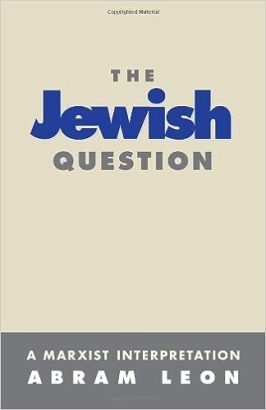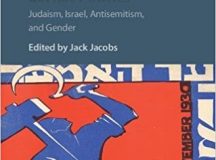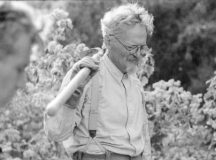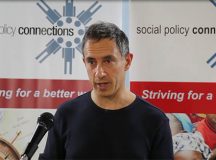Kathleen Hayes argues that Abram Leon, author of The Jewish Question: A Marxist Interpretation, murdered by the Nazis in Auschwitz, is a man of courage and integrity to be honoured. But, she contends, for much of the radical left Leon’s book is still being read uncritically, invoked as a posthumous blessing on a variety of the left’s own theoretical and practical failings.
Two years ago, I accosted a Militant (Socialist Workers Party—U.S.) salesman at ‘No Fear: A Rally in Solidarity with the Jewish People’ in Washington, DC. I felt a bit sorry for him (it was hot and he looked tired), but I couldn’t help myself. I was thrilled, as only an ex-Trotskyist could be, to see a Trotskyist doggedly plying his wares at this Zionist demonstration. We talked (or I talked while his eyes betrayed his longing for a getaway) about Marx and antisemitism, the Enlightenment tradition, Isaac Deutscher. He gave me a leaflet I probably still have somewhere; it was actually pretty good. He told me the SWP had published a new edition of Abram Leon’s The Jewish Question: A Marxist Interpretation and our conversation turned increasingly testy. He obviously thought that by republishing Leon—a young Jewish Trotskyist who was murdered in Auschwitz—his party was demonstrating its commitment to fighting antisemitism. I thought that by upholding Leon’s book, they were revealing their obstinate refusal to learn from history. We did not achieve a meeting of the minds that sweltering July day, and he soon made his escape.
Lately I’ve been thinking about the strange hold Abram Leon has over a segment of the Western left, including the Trotskyist party I belonged to for 25 years. For them—and me all that time—Leon is less a man than a metaphor, a source of nourishment for an array of political and emotional needs. He is socialism’s murdered Jew, who provides in death the martyr’s posthumous blessing to a variety of sins and failings.
Abram Leon, né Abraham Wejnstok, was born in 1918 in Warsaw. He emigrated as a child to Belgium, where he became a leader of the leftwing Zionist Hashomer Hatzair movement. In 1936 he became interested in Trotskyism and for a while tried to reconcile his beliefs in Zionism and revolutionary Marxism. He broke with Zionism in favor of Trotskyism around the time Hitler’s army invaded Belgium. According to the preface of my 1980 edition of The Jewish Question—a biographical sketch by his comrade, Trotskyist leading light Ernest Mandel—in addition to pursuing his research on Jewish history in the shadow of the Nazi occupation, Leon was a leader of Belgium’s small illegal Trotskyist movement; participated in building the European Conference of the Fourth International held in France in February 1944; and helped illegally organise restive miners in the Charleroi region of Belgium. He decided to settle in Charleroi with his wife to participate in these latter struggles and was immediately discovered there by the police, arrested and deported to Auschwitz. He perished in its gas chambers in September 1944.
There are, roughly speaking, two ways of responding to Leon’s story. The first is to hail him for his courage and mourn his tragic end, and reject introspection about his ideas. It’s hard to criticise a martyr; so much is lost in doing so. We all need myths and heroes to sustain us in our chosen paths.
The second way is to sneer. How could anybody, least of all a Jew, reject Zionism at precisely the moment it was so obviously necessary? The man was clearly a deluded fool.
I fall uncomfortably between these camps. In this essay I’ll detail some of the ways I think Leon was wrong, yet first I want to not only acknowledge his obvious courage and integrity, but say I think I can understand why he acted as he did: it wasn’t just crazy or stupid. Near the beginning of the First World War, Rosa Luxemburg wrote that the choices facing future humanity were socialism or barbarism, and she was at least partially vindicated: much of Europe did succumb to barbarism in the 1930s and ‘40s. For Abram Leon, a Jew in Nazi-occupied Belgium, this truly was the final conflict. He could conceive of no partial solutions: only the destruction of capitalism through socialist revolution could save the Jews from the inferno. We now know the conflagration was finally extinguished thanks to the Allied forces rather than socialist revolution—although we also know the cost in human lives and suffering was staggering. For Leon who saw only the horror around him, there must have seemed no other way than to fight as he did.
But we do have the advantage of hindsight, and according to the standards of our terrible knowledge, Leon’s beliefs and actions deserve harsh criticism. He didn’t only sacrifice his own life, after all: he advocated that European Jewry follow his lead. He urged his fellow Jews to reject the Zionists and the promise of Palestine, and stay in Europe to fight for socialist revolution. History delivered instead Auschwitz. This fact calls into question: everything.
Leon had a positive vision as well as a negative one. Not Zionism but Marxism was the key to the Jewish people’s salvation. As Steve Cohen writes in his brilliant treatise That’s Funny You Don’t Look Anti-Semitic, Leon’s book represents ‘the most articulate expression’ of the determinism and rigid assimilationism of the Marxist tradition in its approach to the Jews. The title of his book as well as its approach and conclusions echo Marx’s 1844 essay ‘The Jewish Question’; and Marx’s piece is—how shall I put it? better minds than mine have debated the issue for some 150 years—imbued with antisemitism. So I will begin this critique of Leon by briefly addressing his predecessor and his notorious seminal essay.
It’s true, as Marx’s defenders say, that Marx’s central aim in the piece was to argue, against Bruno Bauer, for political emancipation for the Jews. Yet Marx also claims at length that the ‘worldly cult of the Jew’ consists of ‘huckstering’ and the Jew’s ‘worldly god’ is ‘money’. There really is no charitable way to read Marx’s final clarion cry that ‘the social emancipation of the Jews is the emancipation of society from Judaism’ (emphasis in original). When you define an entire people as precisely the thing you’re against, it’s impossible not to spread hostility against them.
Leon’s signature theory echoes Marx. He argues that the Jews are a ‘people-class’, defined not by religion, language or culture but the Jews’ socially derived role as moneylenders (or usurers) and merchants. This, he claims, is both the source of the Jews’ survival and the root cause of antisemitism. His approach is not only purely deterministic, but as historians have pointed out (see, e.g., Enzo Traverso), he’s wrong on many of the details. Those who endorse the book sometimes acknowledge these errors, suggesting they are attributable to the difficult conditions under which he worked. The real problem with Leon’s book, however, is not its specific historical inaccuracies but the whole gestalt: the conflation of Jews with moneylending and trade and the upholding of the entirety of the Marxist attitude towards ‘the Jewish Question’ in the hundred years preceding the Holocaust.
A consistent downplaying of Western European (as opposed to pogromist Eastern European) antisemitism; inordinate concern with fighting ‘philosemitism’ rather than antisemitism; a tendency to view antisemitic movements somewhat positively as embryonically ‘anti-capitalist’; a desultory response to antisemitic roiling such as the Dreyfus affair; a dogmatic insistence on universalism and denial of Jewish particularism; of course, the castigating of Zionism as ‘reactionary’: all these were consistent features of Social Democracy, which were inherited by the Communists and Trotskyists.
And it took some real obstinacy on the part of the orthodox Marxists to defend this course: there were challenges to them, stark warnings that were hotly rejected. In the early twentieth century, for instance, Otto Bauer, a leading figure of Austrian Social Democracy, published a book arguing that the rise of capitalism had begun an irreversible movement towards assimilation which the Jewish people must not resist. As he later emphasised: ‘Any attempt to artificially block assimilation and to cultivate inside Judaism an ideology opposing assimilation goes against progress, is reactionary.’[1]
Marxist Zionist Maxim Anin objected to the negative manner in which most Marxists, including Bauer, depicted the Jewish people and responded that it was ‘a psychological nonsense’ to advocate assimilation as a programme. He countered that there ‘also exists another Judaism—the enormous majority of the Jewish people—which is neither assimilated nor the prisoner of religious orthodoxy, which struggles energetically and courageously for the creation of new forms of national self-determination’.
Anin concluded that Bauer ‘preached national suicide’ to the Jews. Do those who honour the Marxist legacy on ‘the Jewish Question’—the approach upheld in Leon’s book—not today find these words haunting, and a reproach worthy of seriously grappling with?
What about Luxemburg, one of the Marxist movement’s most revered (and martyred) heroes? There is much to admire about Luxemburg, including her consistent opposition to antisemitism. Yet there are also these words: ‘What do you want with this special suffering of the Jews?’ she demanded in a letter to a friend:
The poor victims on the rubber plantations in Putumayo, the Negroes in Africa with whose bodies the Europeans play a game of catch, are just as near to me … Oh, this ‘sublime stillness of eternity’ in which so many screams have faded away unheard. It rings with me so strongly that I have no separate corner in my heart reserved for the ghetto: I am at home wherever there are clouds and birds and human tears.[2]
Does this passionate cry for solidarity with the world’s oppressed (made by a Polish Jew who herself survived a pogrom) not have a drearily familiar ‘Jews Don’t Count’ quality about it? And given what we know of history, is it not worth thinking about how even some of the Marxist movement’s most consistent opponents of antisemitism were so seemingly dismissive of the Jews’ ‘special suffering’?
Leon’s book says little about the Soviet Union, and what’s there is appropriately critical, but because it’s so central an issue to any contemporary Marxist it’s necessary to at least briefly address it. For Trotskyists, the Russian Revolution was supposed to, if not resolve the Jewish Question (as an isolated backward country, it could only achieve so much), at least demonstrate the triumph of universalism over particularism. The Bolsheviks promised liberation for Jews and non-Jews alike, suggesting antisemitism would by necessity disappear over the course of the revolutionary struggle.
History played out differently, and the dark side can’t all be attributed to ‘Stalinism’. As Alan Johnson has put it, leftists tell themselves a fairy tale to deny that ‘Bolshevik practice after October was an authoritarian travesty of socialism’. But I’ll limit myself here to the point that whatever their intentions, the logic of Bolshevism ineluctably redounded against the Jews. However committed the Bolshevik leadership was to fighting antisemitic violence (and I think they were), the Russian Revolution played a huge role in unleashing it. (‘Down with the Jew Kerensky, Long Live Trotsky!’ Alexander Kerensky read in an indicative graffito as he fled the Winter Palace.) And once again, there were warnings that the Bolsheviks had to ignore to plunge ahead with their plans. To take one example, in late October 1917 a Jewish newspaper warned on its front page that ‘social revolution in the minds of the Petrograd masses has become synonymous with “Jewish pogrom”’.[3]
These horrors didn’t take place immediately. But in Ukraine by the spring of 1918, Brendan McGeever notes, despite the Bolshevik leadership’s longstanding opposition to antisemitic terror, ‘In Hlukhiv, Bolshevik power was actually consolidated through anti-Jewish violence’ carried out by Red Guards and local “Bolsheviks”’. Although the Bolshevik leadership made real attempts to stop the atrocities happening in their name, he found, their seizure of power had alienated most of their potential allies, leaving them isolated. In this position of weakness, they could neither prevent nor entirely suppress the pogromist bloodletting carried out by those on both sides of the civil war. More than any other people, it’s Jews who have paid the price for the socialist vision.
I agree with Johnson that, ‘More than any other Marxist, it was the Russian revolutionary leader Leon Trotsky who, in the years before his murder in 1940, broke from the unscrupulous optimism of Marxist orthodoxy on the Jewish question.’ Trotsky fought Nazism (and Stalinism) with an almost unparalleled sense of urgency and growing clarity. There are signs he became interested in Jewish life in Palestine and began to grapple with Zionism as the European Jews’ situation became increasingly desperate; but as Johnson puts it quoting Sean Matgamna, it was ‘a different, socialist version of the Zionist territorial state-creating solution’ (emphasis in original). Trotsky never repudiated his characterisation of Zionism as ‘reactionary’, and for most of his ostensible followers, this is enough to affirm their belief that in joining a thousand foam-flecked anti-Israel demonstrations, they are being good Trotskyists.
They don’t know that in an interview Trotsky held with Jewish correspondents in January 1937, he wistfully remarked:
During my youth I rather leaned towards the prognosis that the Jews of different countries would be assimilated and that the Jewish question would thus disappear, as it were, automatically. The historical development of the last quarter of a century has not confirmed this perspective.
The ‘prognosis’ Trotsky spoke of had been shared by virtually the entire Marxist movement and defended even as savagery threatened the Jewish people above all others. They insisted the Jews would find their place in the sun alongside their fellow man; instead unimaginable horrors were inflicted on the Jews by their fellow man. I think the left ‘knows’ this in some uneasy way. This is why they’re so drawn to antisemitism. Jews are hated for reminding them of the ‘special suffering’ associated with the socialist dream, and to some extent caused by it.
In the more than 75 years that have passed since the Holocaust, only one Marxist, as far as I know, has even passingly touched on this question. In 1954 the Trotskyist intellectual Isaac Deutscher wrote an essay called ‘Israel’s Spiritual Climate.’ Deutscher, a Polish Jew, had grown up near Oswiecim and seen almost his entire family murdered in that place, now called Auschwitz. Deutscher remained deeply conflicted about Zionism after the war, and like so many other leftists was harshly critical of Israel in 1967, the year of his death; but in this essay made the following remarkable comment:
I have, of course, long since abandoned my anti-Zionism, which was based on a confidence in the European labour movement, or more broadly, a confidence in European society and civilisation which that society and civilisation have not justified. If, instead of arguing against Zionism in the 1920s and 1930s, I had urged European Jews to go to Palestine, I might have helped to save some of the lives that were to be extinguished in Hitler’s gas chambers.
Few Trotskyists know about this suggestion of remorse from one of their own; as a Trotskyist I certainly didn’t. They prefer different narratives, semi-religious accounts of martyrs and saints and a History-ordained battle in which they are clearly on the side of the angels.
For all the anguished personal responsibility Deutscher suggests above, he still believed in ‘the non-Jewish Jew’—the Enlightenment’s ‘universal man’—and his irrevocable march towards freedom:
[All] these men, from Spinoza to Freud, believed in the ultimate solidarity of man; and this was implicit in their attitudes towards Jewry. We are now looking back on these believers in humanity through the bloody fog of our times. We are looking back at them through the smoke of the gas chambers, the smoke which no wind can disperse from our sight. These ‘non-Jewish Jews’ were essentially optimists; and their optimism reached heights which it is not easy to ascend in our times. They did not imagine that it would be possible for ‘civilized’ Europe in the twentieth century to sink to a depth of barbarity at which the mere words ‘solidarity of man’ would sound as a perverse mockery to Jewish ears.
Deutscher challenges his reader to maintain optimism despite everything. There’s a lot to be said for optimism, but it must be tempered by greater understanding. The smoke of the gas chambers has still not dispersed; in fact, society’s vision is cloudier than ever. Deutscher, Trotsky and Leon believed that freedom for the Jews would come with the inexorable march of progress, only to see the Jews suffer unimaginable horrors as barbarism triumphed instead. Leon died fighting for a flawed vision. It’s long past time for Marx’s heirs to grapple with the inferno that took so many Jewish lives including his, and try to come to terms at last with the Enlightenment’s most terrible deliverance.
References
Cohen, Steve (2005) That’s Funny You Don’t Look Anti-Semitic: An anti-racist analysis of left anti-semitism. Libby Lawson and Erica Bunnan, ed. Engage. https://workersliberty.org/files/2020=11/thatsfunny.pdf
Deutscher, Isaac (1954) ’Israel’s Spiritual Climate’. https://www.marxists.org/archive/deutscher/1954/israel.htm
Deutscher, Isaac (1958) ‘Message of the Non-Jewish Jew’ https://www.marxists.org/history/etol/newspape/amersocialist/deutscher01.htm
Elmaliach, Tal (2017) ‘The “Revival” of Abram Leon: The “Jewish Question” and the American New Left’, Left History: An Interdisciplinary Journal of Historical Inquiry and Debate, Volume 21, No.2. https://lh.journals.yorku.ca/index.php/lh/article/view/39375
Geras, Norman (2017) ‘Marxists before the Holocaust.’ In The Norman Geras Reader: ‘What’s there is there’. Cohen, B. and Garrard, E., ed. Manchester: Manchester University Press (Kindle edition).
Johnson, Alan (2018) ‘In Defence of Ernest Erber’, Solidarity, 5 December. https://www.workersliberty.org/story/2018-12-05/defence-ernest-erber
Johnson, Alan (2019) ‘Leon Trotsky’s Long War Against Antisemitism’, Fathom, March. https://fathomjournal.org/the-fathom-long-read-leon-trotskys-long-war-against-antisemitism/?highlight=Trotsky
Leon, Abram (1980) The Jewish Question: A Marxist Interpretation. New York: Pathfinder Press
Marx, Karl (1843) ‘On the Jewish Question’. https://www.marxists.org/archive/marx/works/1844/jewish-question/
McGeever, Brendan (2019) Antisemitism and the Russian Revolution. Cambridge University Press.
Traverso, Enzo (2019) The Jewish Question: History of a Marxist Debate. Chicago: Haymarket Books.
Trotsky, Leon (1970) On the Jewish Question. Montreal: Pathfinder Press.
[1] Traverso 2018: 73.
[2] Geras 2017: 156.
[3] McGeever 2019: 31-35.





































